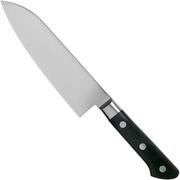

You have an outdated webbrowser. The website might not work correctly.
The santoku is an iconic Japanese kitchen knife. It is the Japanese version of the chef's knife. The word santoku means: three virtues. According to some, this refers to the cutting, crushing and scooping qualities that the santoku is known for. Others say it stands for meat, fish and vegetables. The three ingredients that can easily be cut with a santoku. All we know is that a santoku is an incredibly versatile kitchen knife that is perfect when cutting, crushing and scooping meat, fish and vegetables.
Looking for a santoku knife that’s a cut above the rest?
Don't panic, we'll help you find it!
The handle of a santoku is often located at the same height as the spine of the blade. As such the hand you use to hold the knife has a lot of room when you use the knife. In addition, some santokus, like many other Japanese knives, are enhanced with D-shaped handles. Keep in mind that this could mean that the knife is meant for left or right-handed use. You should pay close attention to this when you purchase a santoku or other Japanese kitchen knife.
Another important consideration is the steel type of the blade. Many traditional Japanese santokus have a blade made of carbon steel. For example, Aogami (blue paper steel). This means the steel is incredibly hard, and very easy to sharpen to razor-sharpness. However, it also means that the blade is not stainless. A patina will form in time, and if you're not careful, rust can form too.